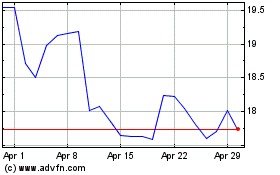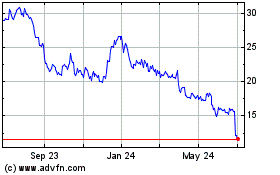CVS Eases Doubts About Aetna Acquisition -- WSJ
May 02 2019 - 3:02AM
Dow Jones News
By Sharon Terlep and Anna Wilde Mathews
This article is being republished as part of our daily
reproduction of WSJ.com articles that also appeared in the U.S.
print edition of The Wall Street Journal (May 2, 2019).
CVS Health Corp. delivered stronger-than-expected results in its
first full quarter as a combined health-care company, taking a step
toward selling skeptical investors on its acquisition of insurer
Aetna Inc.
The nearly $70 billion acquisition, which closed in November,
created an industry giant that combines a retail pharmacy,
pharmacy-benefit manager and Aetna's insurance businesses.
CVS said Wednesday that the insurance business performed well in
the latest period while its drugstores notched increased sales and
higher profit on brand-name drugs.
The first-quarter results mark a shift from February when the
Woonsocket, R.I.-based company offered a downbeat earnings
projection for 2019 that sent shares tumbling. The latest
performance also distinguishes CVS from rival Walgreens Boots
Alliance Inc., which reported weaker profits in the most recent
quarter and lowered its forecast citing weaker profit from
generic-drug sales.
"Considering that expectations have been low, we see this as the
first positive catalyst that restores investor confidence in this
management team," SVB Leerink analyst Ana Gupte said.
Investors have been pressing CVS for a clearer picture of its
growth prospects, and the company has promised to detail its plans
in an investors day presentation set for June 4.
CVS shares lost a third of their value after the completion of
the Aetna deal, erasing roughly $34 billion of market value. On
Wednesdays, the shares were up 5% at about $57 in afternoon
trading.
"None of us are happy with where our stock price is," CVS Chief
Executive Larry Merlo said in an interview. "From our perspective
we're very early. We're creating a pathway that no one has gone on
in an effort to make health care more local and make it more
simple."
Shareholder discontent was evident at a lunch meeting that Mr.
Merlo and finance chief Eva Boratto held with investors in early
March. The discussion was tense, according to an investor who
attended, with the audience pressing the company for more clarity
on its long-term financial expectations.
Commenting on the March meeting, UBS analyst Kevin Caliendo said
in its wake that there appeared to be a "growing credibility issue
with investors on how the company is framing the organic path
forward for the retail, and consternation that synergy realization
isn't flowing enough to the bottom line to generate accretion from
the deal."
The company's first-quarter results and call with analysts "will
help investor sentiment," Mr. Caliendo said Wednesday. "The next
big hurdle is going to be visibility on 2020 earnings and earnings
growth."
Analysts said many of the challenges for CVS are tied to broad
policy issues affecting its core businesses. Shares of health
insurers have slumped -- even for those with strong earnings -- as
debate over the industry's future has highlighted Democratic
interest in universal government-provided insurance.
CVS has said its deal to conjoin drugstores, a pharmacy-benefit
manager and an insurer would help cut health-care costs and improve
care. Mr. Merlo has talked about how the merged company will help
ease the fragmented health-care experience for consumers.
CVS is also remaking some of its stores into health hubs,
offering a broader range of services, many aimed at people with
chronic health conditions such as diabetes. The company has said it
hopes to save money and bolster care by improving patients'
adherence to their prescriptions and having lower-cost sites
provide care, instead of emergency rooms.
"Our first full quarter of combined operations was a success in
many ways," Mr. Merlo said in a statement.
CVS reported a first-quarter profit of $1.4 billion, or $1.09
cents a share, up from $998 million, or 98 cents a share, a year
earlier. Revenue jumped 35% to $61.6 billion. Analysts polled by
Refinitv were expecting $1.05 a share in earnings for the latest
period on revenue of $60.39 billion.
The company, which realigned its reporting structure to reflect
last year's acquisition, said Aetna contributed $16.6 billion in
revenue to its health-benefits segment with a boost from strong
sales of Medicare products.
Same-store sales for its retail chain increased 3.8%, beating
the FactSet estimate of a 1.2% increase. The company credited its
selling more health-focused offerings, and an increase in pharmacy
claims. Prescription volume grew 5.5% from the same period a year
earlier, though Mr. Merlos said lower margins on prescription drugs
will last throughout the year.
CVS raised it forecast, saying it expects adjusted earnings per
share of $6.75 to $6.90, up from $6.68 to $6.88. The improved
outlook remains below analyst expectations headed into 2019.
Write to Sharon Terlep at sharon.terlep@wsj.com and Anna Wilde
Mathews at anna.mathews@wsj.com
(END) Dow Jones Newswires
May 02, 2019 02:47 ET (06:47 GMT)
Copyright (c) 2019 Dow Jones & Company, Inc.
Walgreens Boots Alliance (NASDAQ:WBA)
Historical Stock Chart
From Mar 2024 to Apr 2024

Walgreens Boots Alliance (NASDAQ:WBA)
Historical Stock Chart
From Apr 2023 to Apr 2024
